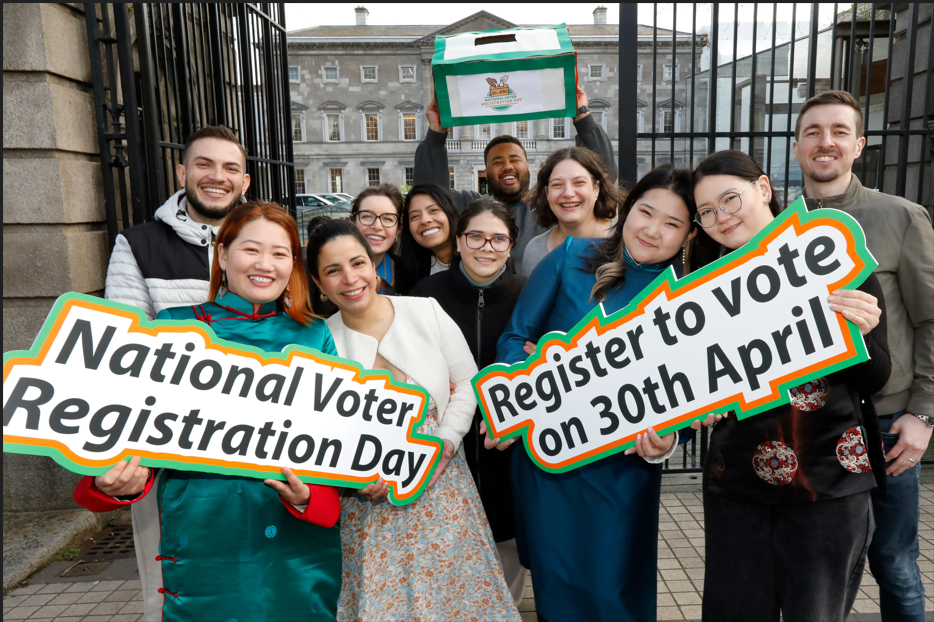
National College of Ireland is proud to participate in National Voter Registration Day.
Vote for the next President of Ireland!
Ireland’s next election for President will take place in Autumn 2025, on or up to 60 days before 11 November 2025. In order to vote in the presidential election, you must be an Irish Citizen over the age of 18, ordinarily resident in Ireland, and you must be registered to vote. If you have changed address since you last voted, don’t forget to update your details on the Electoral Register. Go to checktheregister.ie to see if you are already registered or to update your details, as well as to find other information about voting in Ireland.
All Irish citizens over the age of 18 and ordinarily resident in Ireland may also vote in General, Local and EU elections. Those over 18 who have graduated from specific universities in Ireland may vote in Seanad Elections as part of the Higher Education constituency.
Non-Irish Citizens have specific voting rights
If you are not an Irish Citizen but are ordinarily resident in Ireland, it is still important to register to vote once you are 18 or older.
- British Citizens who live in Ireland can vote in General and Local elections.
- EU Citizens who live in Ireland can vote in European and Local elections.
- Non-EU Citizens, including asylum seekers, can vote in Local elections.
Wed 30th April NCI Mayor Square
NCI holds voter registration drives throughout term time, in cooperation with USI. National Voter Registration Day falls while our students have finished lectures for the semester and are in preparation for exams and so our main participation in this national campaign will be online. However, NCI staff and students will be available in the Mayor Square Atrium from 12-1pm on April 30th to greet you in person and help you:
Why should I vote?
Historically, voting rights have been a central issue in the fight for civil rights and social justice. Many people have fought and sacrificed to secure the right to vote for all citizens, regardless of race, gender, or socioeconomic status. Voting is a way to honour and preserve these hard-won rights and ensure that everyone's voice is heard in the democratic process.
In Ireland, we hear news from the USA and the UK as much as we do from the EU, and a common theme can be “there’s no point in voting, it doesn’t make a difference anyway”.
The USA operates a two-party system with the Republicans and Democrats dominating the political landscape, so that ‘third parties’ find it hard to get a look-in (some local and state elections excepted). If you’re unhappy with both the Republicans and the Democrats, this can leave you feeling you have no choice at all. In the UK, the system is First Past the Post, where you can select only one candidate (except in some NI and Scottish elections) – again, votes tend to go to the dominant parties and/or the already familiar politicians, so it can again feel like your vote doesn’t make a difference.
In Ireland, our electoral system is PR-STV (Proportional Representation - Single Transfer Vote), which means you get to decide who gets your first vote, your second, your third… right to the end of the ballot paper, if you wish, so that the distribution of elected representatives corresponds more closely with the proportion of total votes cast – that is, your vote is more likely to have an impact on who represents you. Proportional Representation also encourages political parties to cooperate and to build consensus, rather than creating the extreme divisiveness apparent in other countries.
Ireland is considered one of the most democratic countries in the world, and voting is one of the most straightforward ways of exercising your democratic franchise. Voting allows individuals to have a say in who represents them. Elected officials make decisions on behalf of their constituents on issues such as healthcare, education, taxation, and social services, and voting is the primary means through which citizens can choose representatives who reflect their values, priorities, and concerns. Voting allows people to reward politicians who have performed well and to express dissatisfaction with those who have not.
Presidential, General, European, Local…What does it matter?
Before you cast your vote, it is useful to know what is within the powers and responsibilities of the specific role you’re voting for – if a presidential candidate promises you “an Ireland that’s better for business” or “a Luas to the airport” or “housing for all”, there is really no point in voting for them, because it means they do not understand the remit of the President of Ireland, who could not deliver on any of those promises. Similarly, a local councillor, an MEP, a Senator (member of the Seanad) and a TD may all be able to wield influence on the issues that most affect you, but to understand if their promises can actually mean anything, it’s important to understand the different roles.
Don’t forget the basics